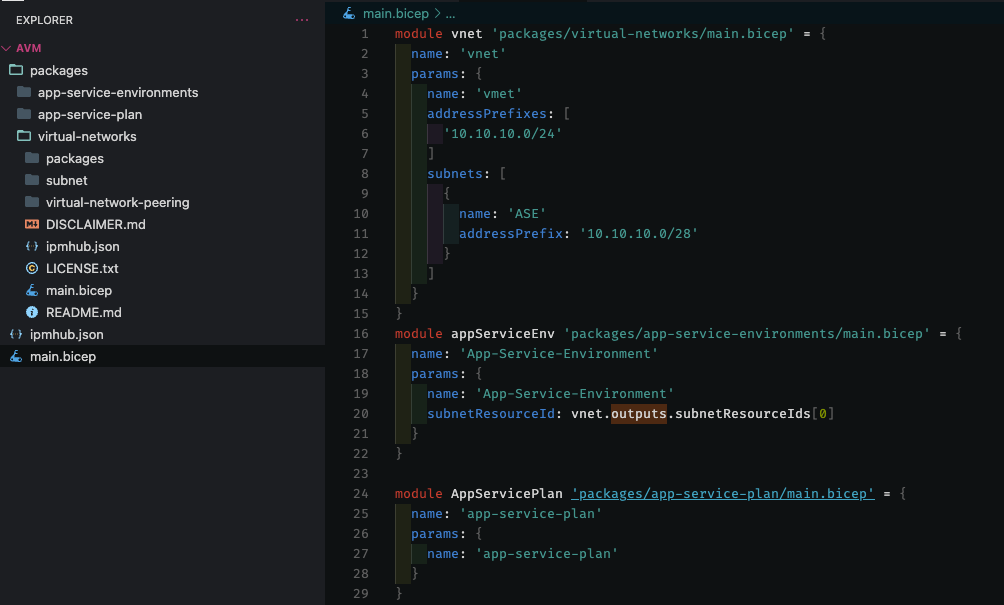Stop struggling with complex Azure deployments
Infrastructure engineers waste countless hours maintaining inconsistent modules, dealing with external dependencies, and manually updating code. It shouldn't be this hard.
With IPM, you gain direct access to every Azure Verified Module (AVM) for Bicep—directly in your own Git repository. No external dependencies. No complicated setups. Just gold-standard infrastructure modules ready for deployment.

Infrastructure Complexity is Costing You
Time Wasted
Engineers spend 40% of their time managing module dependencies instead of building valuable solutions
Inconsistent Deployments
Different teams using different module versions leads to unpredictable behavior and security risks
External Dependencies
External module references create deployment failures when registry connections fail
We Understand Your Infrastructure Challenges
For years, we've watched infrastructure teams struggle with the same problems. That's why we created IPM—to give you back control of your infrastructure code.
Drawing on our 10+ years of Azure and Infrastructure as Code expertise, we've created a solution that combines our knowledge with Microsoft's Azure Verified Modules to make them accessible without the typical complexity.

Official Microsoft Partner
Verified integration with Azure

Your Path to Simpler Infrastructure
1
Install IPM
One command to set up IPM and connect to get started
winget install IPMHub.IPM
brew brew tap ipmhubio/ipm
brew install ipm
2
Add AVM Modules
Get any AVM module for free with a simple command
ipm add -p avm-bicep/virtual-machines
3
Start Building
Use modules directly in your Bicep files with full AI assistance
module vm 'packages/virtual-machine/main.bicep' = { ... }
Let AI Write Your Infrastructure Code
When you use IPM, tools like GitHub Copilot become infrastructure experts. Since your AVM modules are stored locally in your Git repository, AI tools have complete context of your infrastructure requirements.
Get intelligent module parameter suggestions
Generate entire resource configurations
Auto-complete complex Bicep expressions
Always use latest module versions

Azure Verified Modules
| Name | Description | Version | Last update |
|---|
What Are Azure Verified Modules?
Azure Verified Modules (AVM) define the gold standard for quality Infrastructure-as-Code (IaC). Developed by Microsoft and trusted partners, AVM ensures consistent, best-practice configurations ideal for cloud-native and migrated applications. Supporting languages like Bicep and Terraform, AVM enables developers to build reliable solutions with Microsoft's official guidance, community-driven input, and a unified code base.

Don't Risk Your Azure Deployments
See how IPM helps you avoid common infrastructure management failures
| Challenge | Without IPM | With IPM |
|---|---|---|
| External Dependencies | Deployment failures when registry connections break | All code stored locally in your Git repo |
| Version Control | Manual tracking of module versions | Automatic version management |
| AI Integration | AI tools lack context of external modules | GitHub Copilot has full context of modules |
| Module Updates | Manual process prone to errors | One command updates all modules |
| Documentation | External websites, often outdated | Built-in docs synchronized with code |
Teams Like Yours Are Already Succeeding
Hear from engineers who've transformed their Azure infrastructure management

Dennon O.
Cloud engineer
"IPMHub makes it much easier for me to deploy landing zones and packages. This gives me more time for what really matters, drinking coffee."

Rex de Koning
DevOps Engineer
"IPM saved me hours per project providing bicep modules like AVM from central together with our inhouse modules. Also because of the way it operates it provides Life Cycle Management out of the box, and it helps to get our IaC codebases but also our Powershell module projects in a consistent form across all projects and platforms."

Bob van D
Tech Lead
"We underestimated the time savings achieved through IPM integration with AVM modules. Each successive project demonstrates incremental efficiency improvement with the option to reuse complete projects in a single command."
IPM AVM
We believe in the value of Azure Verified Modules (AVM), which is why we've made them freely accessible through IPM. By providing seamless, direct access to AVM modules, we aim to equip you with reliable, best-practice IaC solutions, so you can concentrate on driving project success without hassle.
Start Building Better Infrastructure Today
Simplify your Azure deployments with IPM's innovative approach to infrastructure management
No credit card required. Free tier includes unlimited public module access.
AVM
IPM
About This Project
- Within the Module itself:
- Appending original AVM Module version metadata
- Appending original AVM Module published date metadata
- Disabling telemetry by default
- Adding a DISCLAIMER.md
- Adding a LICENSE.txt (geen .md)
- Create a new IPM package.
- Download the original AVM package.
- Apply your changes.
- Publish the updated version.